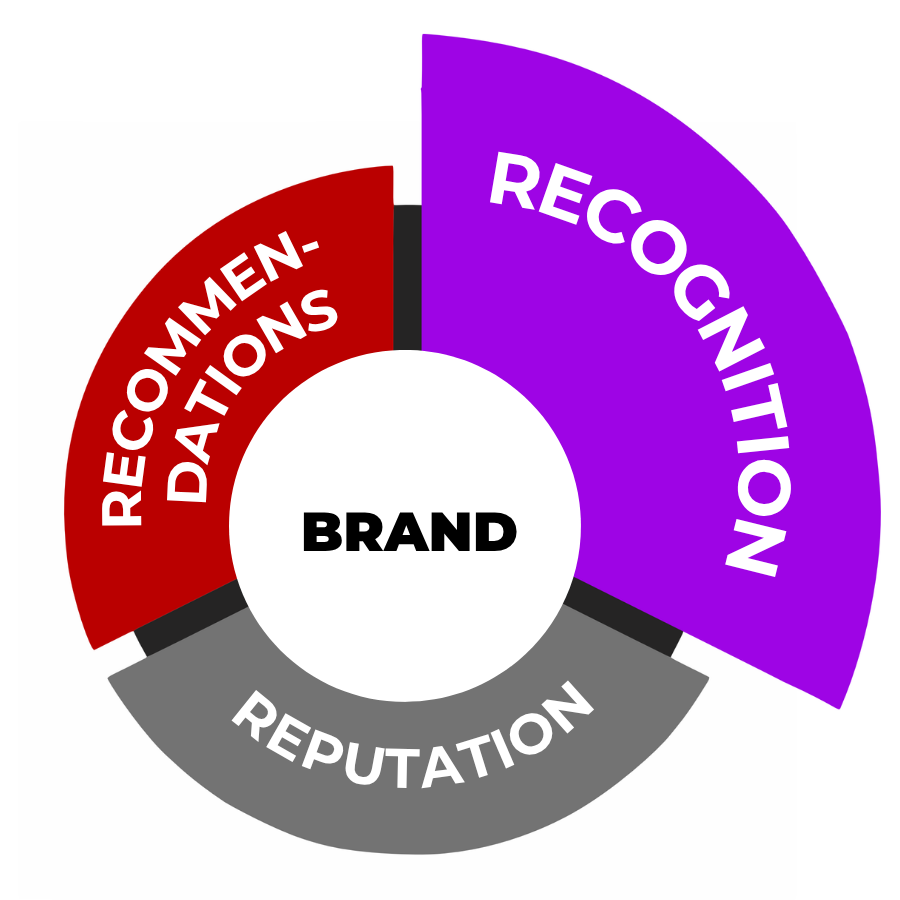How to make your brand more visible and recognisable to AI-powered search tools
In our last post, Why AI search is a big opportunity for small businesses, we looked at why AI search is shaking things up – and why it’s a big opportunity for small businesses who’ve often struggled to stand out in traditional search.
Now we’re taking a closer look at the first of the Three Rs: Recognition.
Because before AI can recommend your business, it needs to recognise it.

Why brand recognition matters in AI search
AI search tools are designed to provide clear, confident answers, and that means pulling information from sources they understand and trust.
If your website is vague, inconsistent, or hard to interpret, it’s easy to get overlooked. The AI won’t “guess” who you are or what you do, it will simply move on to content that’s easier to work with.
That’s why clear branding and strong structure are so important. It’s not just about looking professional – it’s about making sure your business is understood by the tools people are using to find answers.
What does AI need to recognise your brand?
Just like people, AI uses clues to figure out who you are. If those clues are mixed up or missing, your visibility suffers (even if your content is great!)
Here are three simple ways to help AI spot (and trust) your brand:
1. Be consistent with your name and messaging
Your business name, tagline, and key messaging should be the same across your website, social media, directory listings, and anywhere else you’re showing up online.
- Use the same business name everywhere – no variations
- Repeat your core message or positioning in multiple places (home page, about page, footer, etc.)
- Reinforce what you do and who you do it for – clearly and plainly
This helps AI (and your potential customers) connect the dots, and strengthens your presence across the web.
2. Structure your content clearly
AI search tools rely heavily on structure – they scan your site to understand what content belongs where.
Make sure you’re using:
- One H1 heading per page (your main title)
- Clear H2 and H3 subheadings to break up sections
- Logical page layouts – not just blocks of text or random info
- Consistent labels like “About”, “Services”, “Contact” etc.
Structured content makes it easier for AI to recognise that your site is relevant and informative, and more likely to feature it in results.
3. Use your brand name naturally in your content
Don’t be afraid to mention your business name within your website content – not just in the header.
You can do this in ways that feel natural:
- “At [Red Swirl Design], we offer…”
- “Clients choose [Red Swirl Design] for…”
- “The team at [Red Swirl Design] specialises in…”
This helps reinforce your brand identity, especially when AI tools are summarising your content.
Bonus: Use schema to give context
We touched on this in the last post, but it’s worth repeating: Schema markup (structured data) helps AI understand the type of business you are.
It’s a behind-the-scenes layer of code that tells search tools, “This is a local business,” or “This is a product,” or “This is a service provider.”
Adding schema for your business name, logo, services, reviews, and contact info sends clear signals that strengthen recognition. Most modern website platforms or SEO plugins make this easy to implement.
Think of it like signage for the web
Imagine walking down a street with no shop signs. You might pass ten great businesses and never know what they do.
Recognition is about putting up that digital signage, so when AI strolls past your website, it knows exactly who you are, what you do, and why you’re worth recommending.
Start simple
You don’t need to rebrand, or rewrite your entire site. Just take a moment to check:
- Is your business name consistent everywhere?
- Does your homepage clearly explain what you do?
- Are your headings structured and meaningful?
- Do you use your business name in your content?
- Is your website sending out strong, clear signals?
If not, a few small tweaks could make a big difference.
Next in the series: Reputation – Why trust signals matter to AI
In the next post, we’ll explore the second R: Reputation. We’ll look at how AI decides which businesses it can trust, and how things like testimonials, reviews, and expertise help your content get noticed.
And if you’re ready to get ahead of the game now, let’s talk.





